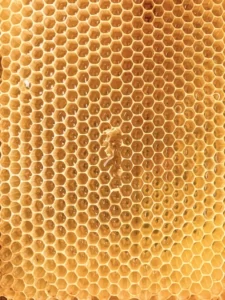Table of Contents
Introduction
People often consider honey to be healthier than sugar, but the truth is that it depends on how they are used. While both honey and sugar are high in carbohydrates and can raise blood sugar levels, they have different nutritional profiles and offer distinct tastes and textures. In this article, we will explore the benefits and disadvantages of both honey and sugar for health and diet.
Similarities and Differences
Honey and sugar are both carbohydrates, composed of two types of sugar: glucose and fructose. However, the proportions of these sugars differ between honey and sugar. Sugar is made up of 50 percent fructose and 50 percent glucose, while honey contains 40 percent fructose and 30 percent glucose. The remaining components of honey include water, pollen, and minerals like magnesium and potassium. These additional components may contribute to the health benefits of honey.
Both honey and sugar can cause spikes in blood sugar levels, but sugar is higher on the glycemic index (GI) due to its higher fructose content and the absence of trace minerals. Additionally, honey has slightly more calories than sugar, although its sweetness means that less may be required. It is important to note that both sweeteners can lead to weight gain if overused.
Benefits of Honey
Honey has been used for centuries as both a sweetener and a medicine. It is a viscous liquid produced by honeybees, ranging in color from straw yellow to dark brown. Here are some of the benefits associated with honey:
More Nutrients and Less Processed
Honey varies in its nutritional composition based on the origin of the nectar used to make it. It contains trace amounts of local pollen, as well as amino acids, antioxidants, enzymes, minerals, and vitamins. Dark honey has been found to have more antioxidants than light honey. Compared to sugar, honey is less processed and is usually only pasteurized before use. Raw honey, which contains more antioxidants and enzymes, is also edible.
Cough Suppressant
Some research suggests that honey can act as a natural cough suppressant, particularly in children. A 2007 study found that children with bronchitis who were given dark honey experienced greater symptom relief compared to those taking a placebo. While honey may provide some relief, it is important to note that medications may offer greater symptom relief.
Allergy Relief
While clinical studies have not consistently demonstrated the effect of honey on allergies, anecdotal reports suggest that locally-produced honey may help reduce seasonal allergy symptoms. One study found that people with birch pollen allergy who took birch pollen honey experienced a significant reduction in symptoms, fewer days with severe symptoms, and increased days without symptoms. These benefits may be due to honey’s antioxidant and anti-inflammatory properties. Local honey may also contain traces of the pollens that cause seasonal allergies.
Topical Use
Honey has shown benefits when applied topically, thanks to its antimicrobial properties. Research suggests that honey can aid in the treatment of chronic wounds, ulcers, and burns. It has also been found to improve seborrheic dermatitis, an itchy and flaky scalp condition. Regular application of honey can reduce hair loss associated with this condition and prevent relapses.
Easier to Digest
Honey may be easier to digest compared to sugar. Bees add enzymes to honey, which partially break down the sugars before consumption. This makes honey more readily digestible compared to sugar, which needs to be ingested before being broken down.
Disadvantages and Risks of Honey
While honey offers several benefits, it is important to be aware of its disadvantages and risks. Here are some of the most common:
High Calorie Count
One tablespoon of honey contains 64 calories, which is higher than the 49 calories in sugar. This higher calorie content can contribute to weight gain if honey is consumed excessively.
Risk of Infant Botulism
Honey should not be given to infants younger than 12 months. It can contain bacterial spores that cause infant botulism, a rare but potentially life-threatening disease. These spores are harmless to older children and adults. Symptoms of infant botulism include constipation, generalized weakness, and a weak cry.
Impact on Blood Sugar and Risk of Illness
Honey has similar effects to sugar on blood glucose levels, which can be problematic for people with diabetes and insulin resistance. Excessive consumption of honey can lead to blood sugar issues in healthy individuals as well, increasing the risk of weight gain, type 2 diabetes, and heart disease.
Benefits of Sugar
Despite its reputation as a less healthy sweetener, sugar does offer some benefits. Here are a few:
Lower in Calories than Honey
Sugar contains 49 calories per tablespoon, while honey contains 64 calories. However, honey is sweeter than sugar, so less may be needed to achieve the same level of sweetness.
Low-Cost and Long Shelf Life
Sugar is a cheap and easily accessible sweetener with a long shelf life. It is a staple in many households and can make various foods more palatable.
Disadvantages and Risks of Sugar
Sugar consumption comes with its own set of disadvantages and risks. Here are some to consider:
Higher on the Glycemic Index than Honey
Sugar has a higher glycemic index than honey, meaning it can cause a quicker spike in blood glucose levels. This rapid increase in energy is followed by a sharp decline, leading to symptoms such as tiredness, headaches, and difficulty concentrating.
Increased Risk of Heart Disease and Type 2 Diabetes
High sugar consumption is associated with weight gain and obesity, which in turn increases the risk of heart disease and type 2 diabetes.
More Problems for the Liver
Since the liver must metabolize refined fructose, high sugar intake can lead to issues with liver function, including nonalcoholic fatty liver disease (NAFLD), cholesterol management, and obesity.
Cavities
A high sugar diet is a major contributor to dental cavities. The sugars in foods and beverages can react with bacteria in the mouth to produce acids that erode tooth enamel.
Changes in Gut Bacteria
A diet high in sugar is associated with a decrease in healthy gut bacteria diversity. This imbalance in gut bacteria can increase the risk of chronic diseases.
More Difficult to Digest than Honey
Sugar does not contain the enzymes found in honey, making it more difficult to digest.
Conclusion
Both honey and sugar have their own unique characteristics and offer different benefits and disadvantages. While honey may contain more nutrients and have some medicinal properties, it is important to consume it in moderation due to its high calorie content. Similarly, while sugar is lower in calories and has a long shelf life, excessive consumption can lead to various health issues. Ultimately, the choice between honey and sugar should be based on personal preferences and dietary needs.



